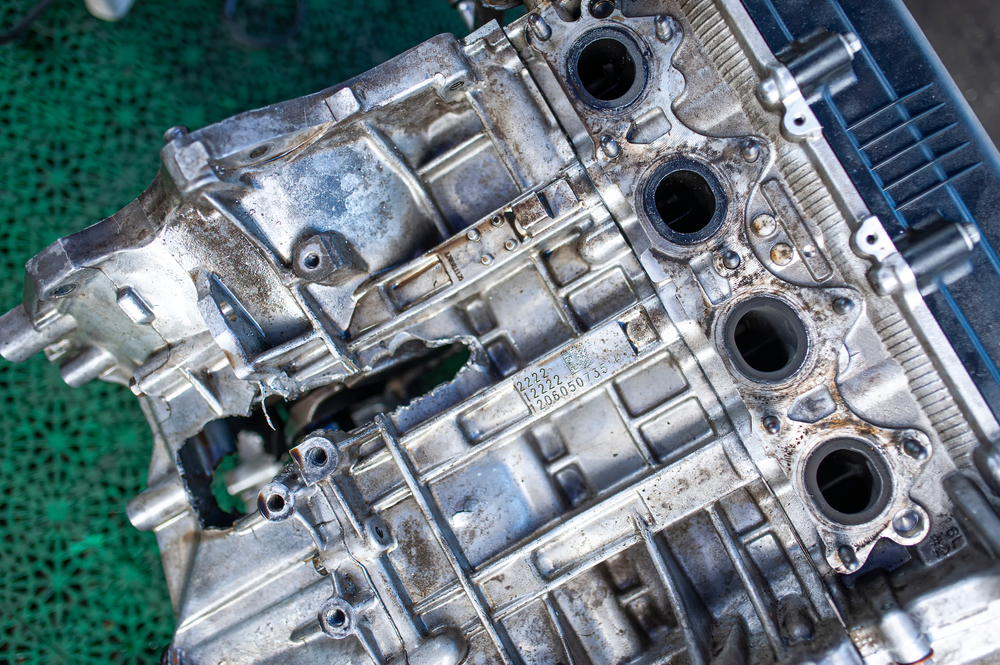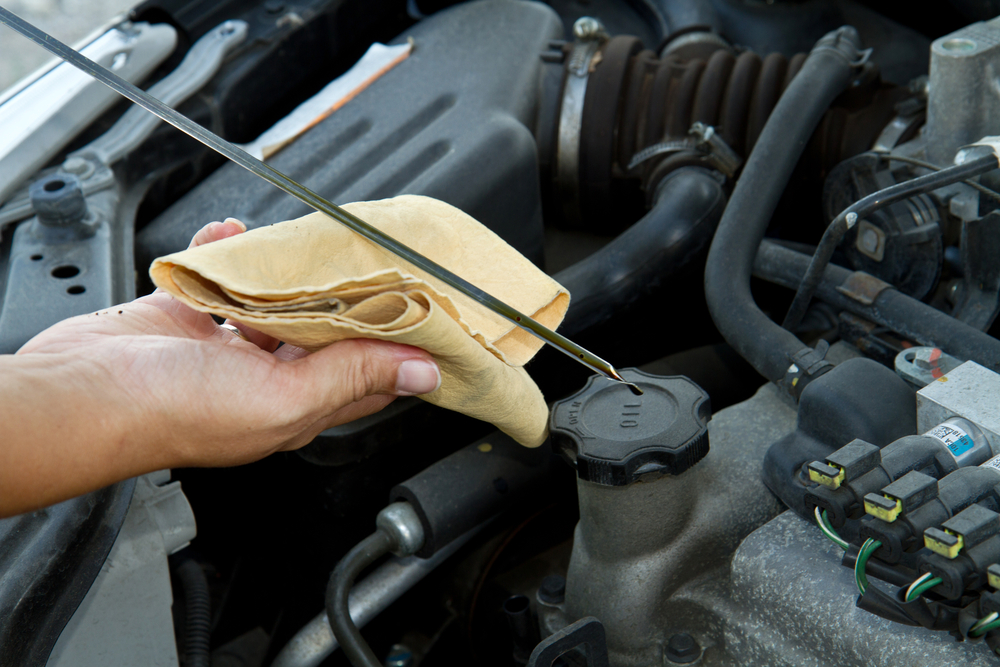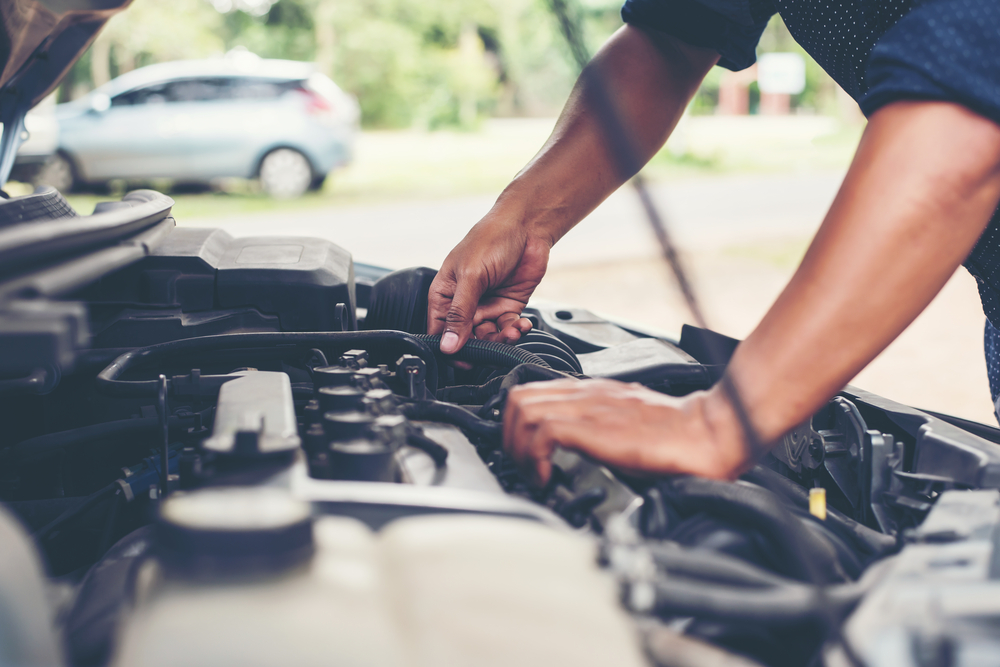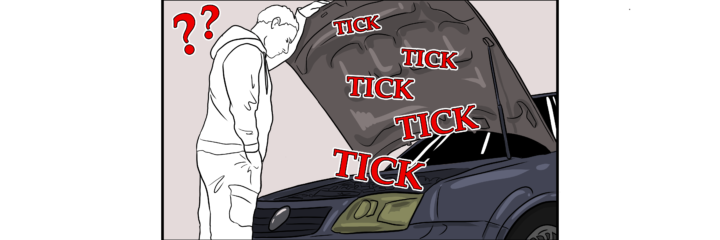Cars have a lot of moving parts. Moving parts tend to make noise. Between spinning tires and the explosions that make the engine go around and around, your car is a one-member symphony. On a regular day, those melodies and harmonies are comforting. They give you peace of mind. Sometimes cars like to make noises that concern you, though. One of the more common and maddening sounds comes in the form of ticking that just won’t go away. Pinging, knocking, tapping, and popping all start to seem like someone rhythmically beating your head with a hammer as you drive down the road.
In addition to the headache, you could be risking serious damage to your engine. It’s a good idea to find and fix the problem as soon as possible.
That’s probably what brought you here to this guide. The following information will help you diagnose and solve the issue, or at least let you know that it’s time to bring a coffee to your favorite mechanic.
Identify as Much as You Can About the Sound
The first step is to determine what is making the noise. To do that, you need to find out where the noise is coming from and what kind of noise it is by answering these questions:
Where Is the Noise Coming From?
When you first hear a ticking noise, chances are you are hearing it from the driver’s seat. There is a lot of insulation in the cabin which makes determining where the noise is coming from difficult, so it is important to get out of the car and do a walk around.
Put the car in neutral and set the parking brake. Pop the hood, start the car, and slowly walk the perimeter. Get down low and see if it is louder under the car. Open the hood and listen closely. Is the noise loudest near the belts and pulleys, near the top of the motor, or underneath the motor?
Be careful with moving around a running engine. Getting a finger in a belt or burning your ear on a hot surface is bad.
You may also want to take the car for a drive just to listen for the sound. Make a note of when the noise occurs. A friend who rides along just to listen can be a very helpful asset. That way you can focus on driving while they focus on taking notes.
What Does It Sound Like?
Different components make different sounds that can all be described as ticking. The type of sound, in addition to the origin of the sound, can further narrow down the possible issues.
Ticking can come in a lot of forms. It can be a deep, dull tick or a sharp, metallic tick. Being able to describe the type of noise helps in finding out what is making the noise.
- Sounds coming from the bottom of the engine will usually be loud and deep. There is a lot of metal surrounding the bottom end, so anything making noise in the lower part of a motor has a lot of material to amplify it.
- On the top of the motor, sounds will be higher pitched. There is very little material between the valve train and the open air. That lack of insulation leads to sharper sounds that are more like tapping on an empty soda can.
- Plastic, steel, and aluminum all have distinct sounds as well. If the noise sounds like plastic being hit with a stick, you can safely rule out the steel exhaust pipe as the culprit. Simply by being logical about what the noise could be, you can quickly eliminate a lot of possibilities.
- Pinging is another common ticking noise that is unique enough to be a category all by itself. Also called knocking or detonation, pinging sounds like a spray can being shaken. You will probably only hear it when you are accelerating, making it an easy diagnosis.
Pinging is a good example of a consistent sound, which brings us to the next question.
Is the Sound Consistent or Random?
The sound will either be a very consistent tap-tap-tap-tap or it will be more random like a tap-taptap-tap—-tap tap. An inconsistent sound is often caused by a loose part or a worn-out component. These worn-out parts cause noise as they bounce around and collide with other parts.
A reciprocating part having a problem will make a very consistent noise. Picture a card in the spokes of a bicycle wheel. Every time a spoke passes the card, it makes the same noise.
An engine is primarily reciprocating parts. That means most noises will be very consistent. If the sound you hear is random, you can very quickly narrow down the issue to a loose or broken component where the noise is loudest.
A consistent noise can be tied to various things, which brings us to the final question.
Does the Frequency Increase With the Wheel or Engine Speed?
When the noise is consistent, you know it is tied to a spinning part, but there are a lot of spinning parts to choose from. By performing a few simple tests, you can quickly determine which reciprocating part it is.
- The easiest test to do is put the car in neutral and rev the engine. Press on the gas and listen to the noise. If the noise gets louder and/or more frequent as the engine RPMs climb, then you know for sure that the motor is making the noise. In neutral, the engine is disconnected from the gears in the transmission and the wheels are not moving, so that only leaves the engine
- If the sound does not increase in noise or frequency while revving, then you have to go for a drive. This is where a friend to help can come in handy. Listen carefully to the sound as you drive around and note if it changes as you go faster.
This is especially important if you only hear the noise when the car is in motion. The wheels, transmission, and driveshafts only spin when the car is moving, so if they are making a noise it will increase in frequency directly with your speed.
- The third option is that the noise is not tied to engine speed or wheel speed. If the noise remains constant at all times, it almost always means there is an electrical issue. Relays, fans, and speakers can all make ticking noises that can be very difficult to find since they are often buried under layers of construction.

The Most Common Problems and Solutions
The type and location of the noise are your keys to knowing what issues to look for. The following are the most common problems for all manner of ticking and what you can do to silence them.
If you ever feel unsure, there is no shame in taking the car to a mechanic. They have special diagnostic tools that can rapidly speed up the process. Tablets and other OBD readers can check for detonation without having to rev the engine, and scopes with microphones or cameras can pinpoint exactly where a sound occurs.
If you are content to tackle it yourself, YouTube can be an amazing resource for finding out what type of sound your car makes. Lots of shade-tree mechanics have uploaded videos of broken vehicles as examples, so searching for the noise your car is making, using your best descriptive words, is a great way to verify what component has failed.
Soft Continuous Clicking
Sometimes a ticking noise is completely normal. Fuel pumps, injectors, and some electrical components just like to click every so often. Fuel pumps have diaphragms that move back and forth, creating a soft click, and fuel injectors have valves that open and close rapidly to regulate fuel pressure.
Over time these components can wear out a bit and get louder. Unless you notice other issues there isn’t cause for concern.
Loud Knocking or Thumping From Deep in the Motor
There are two main problems that this type of sound can be a sign of.
A Bad Bearing
If there is a loud constant knocking you should stop the car and have it towed. It is very likely that the engine is seriously damaged and requires a complete rebuild.
Loose Internal Part
While not as destructive as a broken rod, a loose internal part is still a grenade waiting to destroy your engine. Nuts and bolts can sometimes come loose and fall into the oil pan and bounce around the engine. An improperly tightened component can rattle and cause a lot of noise as well. A loose component can cause a lot of damage, so it’s important to break down the engine and find the culprit.

A Consistent Tapping That Changes Speed With the Engine
If the sound doesn’t stop, and if the speed of the sound depends on the speed of the engine, consider these possible issues:
Low Oil
One of the most common reasons that engines make ticking noises is low oil. If there is not enough oil to properly lubricate parts, they will begin to make noise. There are a lot of parts that all make similar noises when the oil is low, most of them near the top of the engine. It isn’t necessary to know what part specifically is making the noise; no matter what, the solution is the same: fill it up with oil.
Regularly checking the oil is the easiest way to prevent these noises. It is also the easiest way to prevent much worse issues. Low oil causes heat, and heat is the biggest enemy of an engine. Excessive heat destroys bearings and causes the dreaded rod knock.
A Valve Needs Adjustment
The valves that allow gas in and exhaust out of your engine are very precise. Over time they may loosen up and fall out of tolerance. If an arm or lifter is moving around it will make a sound very similar to tapping a pen on a hard surface.
While this is not immediately dangerous to your engine, it is something you should take care of when you have an opportunity. You will have to look up the correct specifications for your engine and invest in a set of feeler gauges to check the clearances. It does not take very much time to do, and while you are doing it you will have the chance to inspect a lot of components all at once.
A Bad Accessory Pulley or Accessory
Usually, rotating parts will make a squealing or grinding noise rather than a ticking when damaged. However, if there is a partial obstruction it can cause a fast clicking or tapping.
If there is a tapping coming from the front of the motor, the two most likely candidates are the fan and the water pump. Both have either plastic or metal blades that spin. If there is a minor obstruction, it will hit the blades and cause a repeating sound.
The fan is easy to diagnose. With the engine off, move the fan around by hand and listen for the noise. Once you hear it, feel for the obstruction and remove it.
To diagnose the water pump, you will need a way to listen directly to it. Take a long piece of metal and press it against the water pump housing. Hold the other end and press your ear up close to use the metal like a stethoscope. If it comes through loud and clear, replace the pump.

A Pinging Sound
Pinging occurs when the air/fuel mixture is detonating at the wrong time. Sometimes called knock, pinging is usually caused because the cylinders get too hot.
The cylinders can get too hot if the cooling system is not adequate for the motor or if you are using the wrong octane gasoline. The easiest thing to try first is to run high octane gas and see if the problem goes away. High octane gas is knock-resistant due to its cooling properties and slower burn time.
Other causes of pinging include a faulty EGR valve or a dirty knock sensor. Both will cause the fuel/air mixture to be incorrect. Usually cleaning these parts is enough to solve any detonation issues.
A Rhythmic Popping That Is Louder Under the Car
If you hear a ticking that is more like a popping, think popcorn in a cast iron pan, then you probably have an exhaust leak. Exhaust leaks are not particularly dangerous to your engine, but they are very annoying.
You will be able to see or feel the exhaust exiting the exhaust pipe at a place it’s not supposed to. Your nose is another great diagnostic tool here. The smell of exhaust should be strong behind the car but not around the engine.
There are no-weld patches available on the market that you can install yourself but an exhaust shop will provide you with the best results. They will be able to weld up any cracks and replace any damaged gaskets.
Noises That Get Louder the Faster You Go
When the tapping gets louder and more frequent the faster you go, that means the culprit is likely a loose component striking a spinning part under the car. Debris stuck in a wheel or near a driveshaft can cause all sorts of repetitive sounds.
The good news is that it’s almost always an easy fix. When rotating parts get damaged, they usually make a squealing or grinding noise, so a tapping noise is probably just a loose piece of something where it shouldn’t be. Remove that something and you will be good to go.
When to Immediately Stop and Repair the Motor
When you have identified the source of the noise, it is important to know that some noises are cause for immediate action. While pinging and light popping can take a while to cause any real damage, a “rod knock” is a sign that your engine has been badly damaged.
If you hear a loud knocking sound, like this, stop running the engine and have the car towed.
Rod koccurs when the bearings on the crankshaft are destroyed. The sound is the connecting rod, the component between the crankshaft and the piston, knocking against other metal parts. Hence the name.
When these bearings are destroyed and you hear the telltale noise, it means the engine is already broken. The engine will have to be rebuilt from the inside out. If you continue to run a motor that is knocking like this. you risk breaking the connecting rod.
When the rod breaks, it’s known as throwing a rod. It is a very destructive event. After the rod breaks free, it can have enough force to break out of the engine and destroy other parts of your car. In the racing world, throwing a rod is the number one way to have a very bad day at the track, and they have entire crews to help. You definitely don’t need it happening while you are alone on your morning commute.
The good news is that there are a lot of warning signs. Many other ticking noises are precursors to a destroyed bearing, which means you have time to prevent it if your motor is already on this path.
To Sum It All Up
Pinging, popping, tapping, and ticking can be highly annoying and potentially damaging. Make sure you keep up on maintenance to prevent those problems. Especially check your oil regularly; it’s hard to overstate how important oil is for your car. If you hear loud knocking, stop driving.
Your ears are fantastic tools for diagnosing problems. Trust in them; if a noise is causing you to go insane, it is not a design feature of your car. Listen, deduce the cause and stop the noise. Your sanity will thank you.


